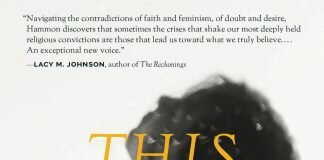It’s the early 90’s. You watch “Gremlins” at a sleepover at your best friend’s house. You love sleepovers; you secretly pray you’ll never have to go home. Your friend and her parents chuckle at the scaly, horn-nailed puppets, while you—Muppet-lover that you are—cover your eyes, hurry out of the room. When a Gremlin stabs a grown man in the buttocks, raucous laughter erupts. But you are silent. You can’t speak. A knife up the ass. You know the word “rape” but not yet “assault.” You hear the word “sodomy” on the radio: it’s a crime a famous athlete has been accused of. When you ask your father what it means, he says, “You don’t want to know.”
You don’t know if your parents have words with your friend’s parents over “Gremlins”—probably not; that’s not really their style. Or perhaps you never tell them about the nightmares, about the terror of the dark that follows your introduction to horror. You are ashamed to be so afraid of something your sweet, mild-mannered friend finds laughable. You wish you were more like her, that you were blonde and had a stay-at-home mom who makes whoopie pies. Instead, at eight years old, then nine, then ten, you see menace in the dark: Your books and toys transform into watchful, deviant creatures. Night renders the familiar foreign. The world, you learn, is not as it seems.
In middle school, you read Anne Rice’s novels about elegant vampires and Southern witches. The books are intensely (homo) erotic, but your father himself lends them to you, plus Stephen King’s Pet Sematary. You are twelve when your rageful, troubled, sometimes tender father loses his job and begins his descent into the depression that will consume him, his marriage. Your reality. The house goes quiet. It is no longer a place anyone wants to be, a palace under a curse. For years you hide in your room, peer around corners as you tiptoe through the downstairs. You’re waiting for your mother to leave so there won’t be a shotgun hidden in your closet anymore, so you won’t have to sit for hours in dark grocery store parking lots, just to escape the house he lives in—your house—the one suffused with stillness, the canned laughter of his TV tittering quietly in the background, the pop of a beer can loud as a shot. There is nowhere else to go. It will be ten years before your mother leaves a note and flees, and you will never see the house again. It will become a place that exists only in your mind: A haunted place, a tomb for childish relics and secrets, a place you dare not enter.
You go to college and immediately form a codependent relationship and move into your girlfriend’s single, two sardines in a twin bed each night. When she goes away for a weekend, you are so overcome with loneliness and fear, you can barely breathe. You don’t cry much in those school years, though you weep into the phone the summer of your first year, the only one you spend at the place called home, as you beg your girlfriend for permission to flee to her and her loving family. (She says no.)
Normally, instead of crying, you disassociate. Since childhood, you’ve observed yourself from the outside: there, but not there. You write strange, prose-driven short stories with no plot. You read ambitiously, write research papers with intersectional angles. You take a painting class your senior year and compose a large self-portrait, your body a blotch of blue, holding an Asian arowana to your breast. Your classmates are perplexed. How can they know arowanas are your father’s favorite, the Asian variety the prize of his well-kept tank? You paint what you cannot say. When your mother leaves, he lets all his fish die. You write a story about it in grad school, win some money from a prize. Your friends say they didn’t realize you knew so much about fish.
After an abortion, after all your schooling is done, including your MFA, you secure a job teaching English at a university in Quito, Ecuador. You don’t speak Spanish, though you study with feverish intensity. You’ve never traveled alone, or lived abroad. You are terrified to move to a country where you’ve never been and know not a soul. But you don’t want to be scared of this. You want to be the heroine. You tell yourself the things worth doing in life are going to be mildly terrifying.
Yet the anxiety you feel ahead of the move is like none other. You lie awake at night, worry your way through a litany of unknowns. How will you open a bank account? How will you even get to your new house, a moldy, ramshackle place you’ll share with three other teachers, who won’t like you. You read guidebooks and try to follow all their excessive recommendations regarding vaccines and money belts. You have no reference point for what you are about to do. You can’t even picture Quito; photos are context-less. You stare, unable to imagine this real place, or yourself in it. You leave your body for a moment. People ask you what Ecuador is like and you tell them about the different fruits and orchids you read about in your guide books. You tell them there are active volcanoes. You don’t say you don’t know what it’s like; how can you know what you do not know?
Shortly before you’re supposed to leave for South America, you and your mother go see “The Descent.” You sit in the theater as the actors clamber down into the depths of the earth, ignorant of the pale, human-ish monsters that await them, slavering goo. You cover your eyes, your mother munches on snacks. It’s happening again. After that, sleep eludes you altogether. You are about to travel into the unknown and every night you lie in a bed that isn’t yours, in a silent house that isn’t yours, terrified of the pitch dark and all it conceals.
You spend four years in Ecuador, far from your house and your father, everyone you know. You write your first decidedly magical-realist story about a girl who shows up at an orphanage claiming the power to shapeshift. You don’t know what it means to have written it, or from which closet of your imagination it escapes, but it gets published in PANK. You write and write, some realist pieces, some not. Then, you churn out a novel in six months: a sprawling, ambitious tale of witches and violence and volcanic eruptions. Your write about snow-capped Cotopaxi at the foot of Ecuador, visible from Quito on a clear day, when the sky is blue as God. But your favorite volcano is Tungurahua, which means “throat of fire.”
Your life in Ecuador is a lonely one, which is how you manage to write so much and teach full time. (Let’s be honest, your life has always been lonely.) There are one night stands. There is a German guy you have a crush on who tells you he is taking you home, then ferries you to his place instead. You have sex on the couch—you don’t say yes, you don’t say no—and then, when he’s finished, he sends you home for real and you fall getting out of the cab, rip your jeans on the cement and gash your knee, adding injury to insult. This story is familiar. It has happened before; it will happen again. Later, there is a boyfriend prone to rage, like your father. He tosses an umbrella at you on your birthday and everyone looks away. He is selfish about his desires, and you acquiesce to them. He calls you “easy” when you confide in him about the abortion. You don’t tell him about the pain, how they play Nora Jones—you hate Nora Jones—and ask you if you want to see what’s inside you. It looks like a thing that would wash up on the beach.
There are many other lovers, more boundaries and national borders crossed. Years later, living in California, there is a husband who vibrates and shimmers with rage. He is paranoid, sees monsters and menace behind every smile. Your marriage is a fetid cage. It travels with you, surrounds you wherever you go. You force out laughter, keep an eye on the clock, avoid other men, stick close to home. You keep secrets: from loved ones, from the husband, from yourself. You’re afraid to let them see what the man you’ve chosen really is. What he’s doing to you.
After you leave him, you finish your first viable novel: dual narratives of grief and queer sexual awakening, set within two NYC hotels, one a quiet, opulent place designed to insulate guests mourning various losses in 5-star solitude, the other an upscale sex hotel. The decor that fulfills guests’ wildest fantasies transforms into a menagerie of sexual grotesqueries when an inexplicable fog envelops the city, trapping seven people inside the hotel. Both are settings primed for violence against others, and the self. The book becomes The Gold Persimmon—your debut with Creature Horror, a feminist horror press. You realize this is what you’ve created, this is what you are: feminist horror.
You do not set out to write what most consider horror to be; you do not intend to frighten readers. Instead, you tug on the red thread of the story inside yourself, and it unspools and unspools. You write from the horror of loss, the hands at your throat. You write from the trauma of abandonment and gaslighting, coercion portrayed as seduction, the body as other. You write without realizing that the terror inherent in the experience of being female is exactly the stuff of which feminist horror is born. It is by its nature unsettling. Your reality is refracted, stretched, colored in black and white and blood.
Once you climb out from the depths of the well, you cannot go back. You try polyamory, date women who make you nervous. You fall in love with someone worthy and it’s as if you’ve known each other from before this life. It’s like you’re in love for the first time, as cheesy as that sounds. You surprise yourself, marry again. You write another book. This time, there’s no holding back. You compose goddesses, terrible to behold. You write more witches and a magical queer bar where there’s never a line for the bathroom.
You think about volcanoes, about throats full of fire. There are impossible truths that can only be spoken through fiction. The thread unspools. It will never stop.
Photo by Izabela Kraus on Unsplash












